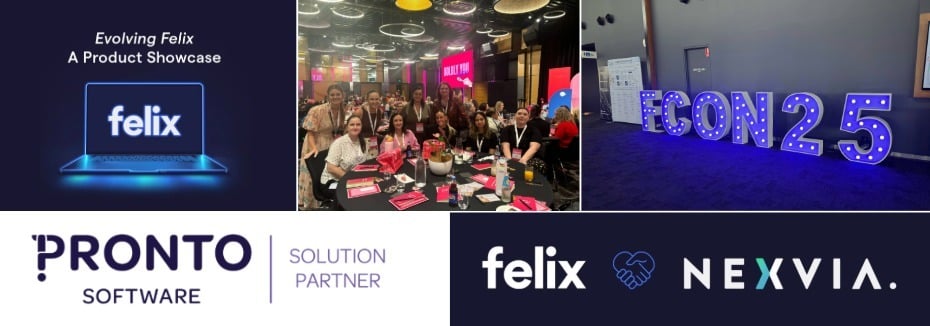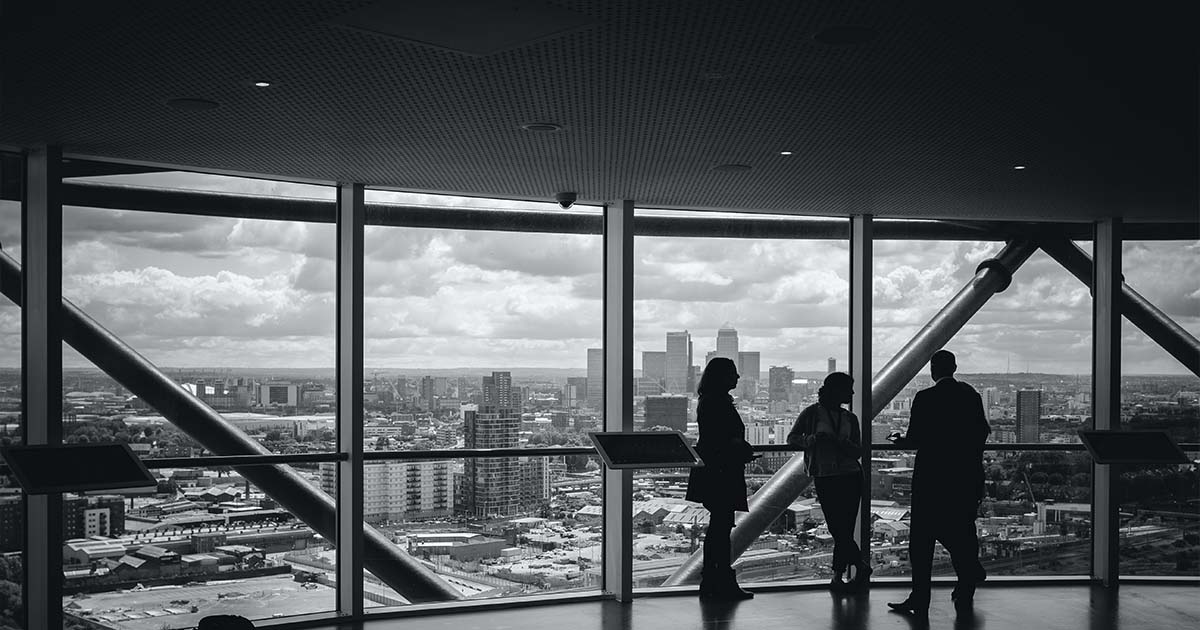This year has been eventful to say the least. We published a landmark report, celebrated Felix’s 10-year journey, and witnessed tremendous ups and downs across the industry. Let’s go through the highlights.
Notable industry reports
Building in The Dark report
Our landmark report on construction supply chain risk was launched in February this year and has been mentioned in several media publications, including the AFR.
The Building in the Dark report - in collaboration with entwine - captures the views of industry players who manage projects ranging from $20 million to over $1 billion in value.
Some key stats:
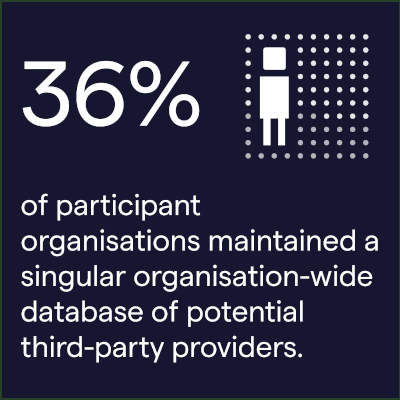
IA Delivering Outcomes report
As an industry participant, it's encouraging to see a comprehensive roadmap with actions interconnecting with each other to deliver outcomes in Infrastructure Australia's report.
As a technology provider serving the construction industry, we cannot agree more on the importance of quality information, data sharing and collaborative relationships.
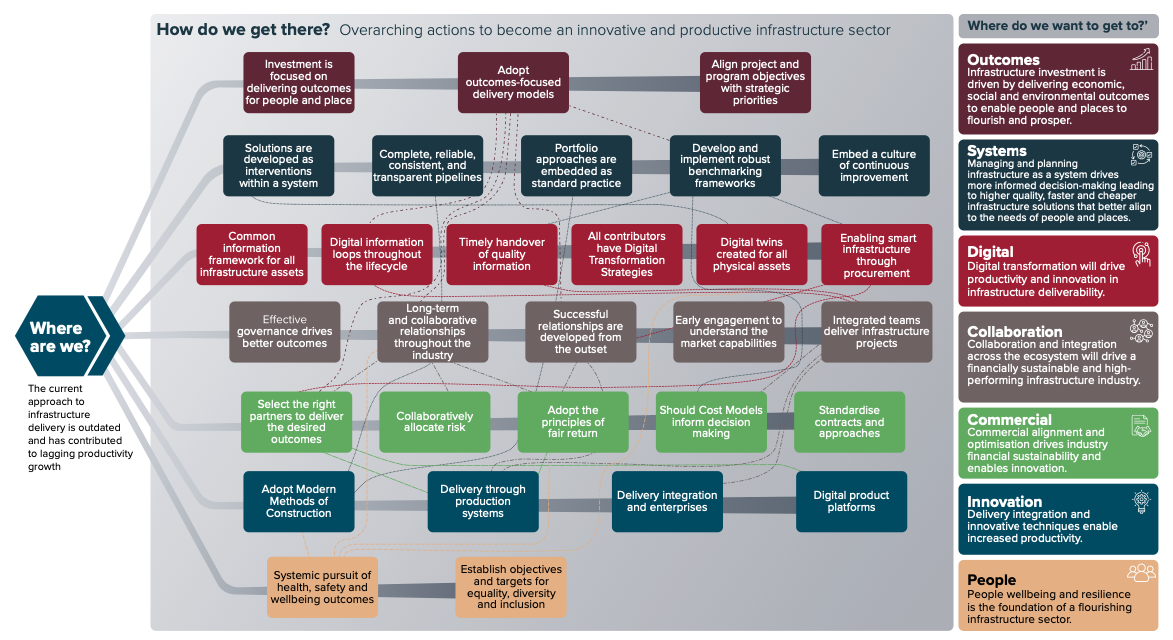
In our Building in The Dark report, we've also recognised the underpinning traits of purposeful communication, and how it flows onto transparency and trust building.
IA Market Capacity report
This month, IA released the 2022 edition of its Market Capacity report, highlighting some dire market conditions and industry confidence stats:
- The cost of construction materials has risen by an average 24% in the last 12 months
- A significant number of construction companies are operating at 90% or above capacity
- A shortage of 214,000 skilled workers this year, with demand projected to double supply next year
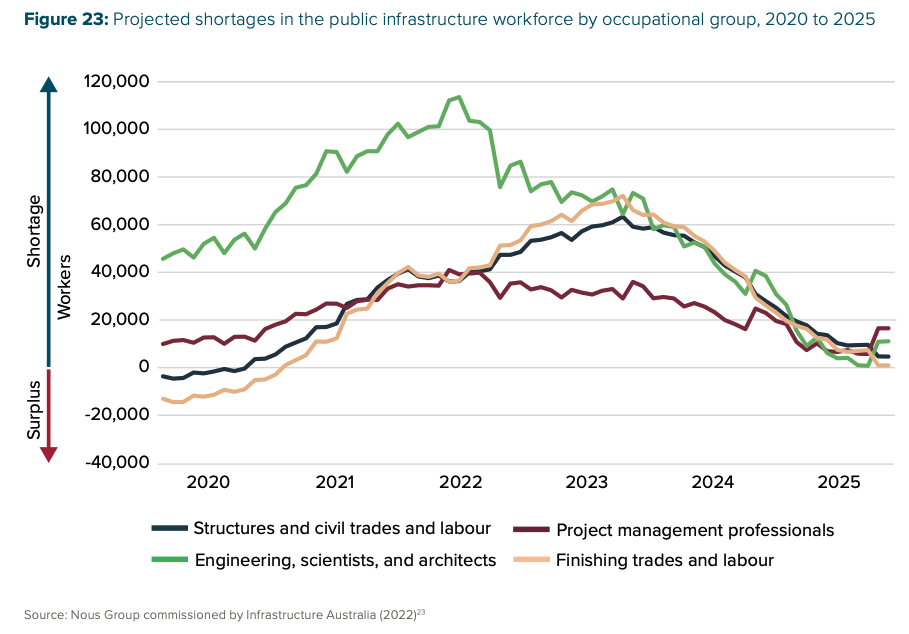
The report warns “it is no longer a question of if a project will slip, but more likely when, by how long and at what cost.”
Reality check
The industry has witnessed three high-profile collapses this year - Probuild, Condev, and Clough.
Supply chain disruptions, rising costs, COVID, risk allocation, fixed price contracts, payment delays have all been cited as contributing factors.
That’s not to mention the backdrop of increased insolvencies across the whole industry this year.
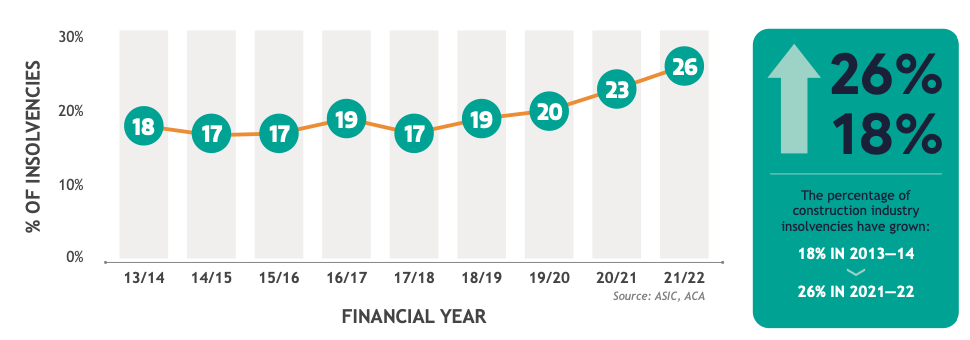
Hence, advocacy bodies such as the Australia Constructors Association (ACA) have called for a range of initiatives, including the proposed Future Australian Infrastructure Rating (FAIR). The idea is to rate projects attributed to delivery government agencies, and share these learnings to:
- Improve outcomes for stakeholders such as contractors and the whole industry
- Drive standards across agencies
Productivity
As noted throughout the year by various bodies, industry reforms are desperately needed, so much so that ACA has proclaimed “Disrupt or Die”.
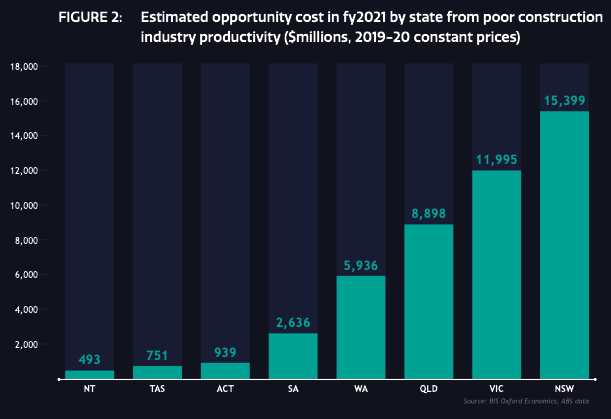
A range of measures to unleash productivity growth include both improving the procurement process/framework and the means to carry out the process (i.e. technology adoption).
We need to evolve from spreadsheets but “there is also no incentive to invest in new technologies if tenders continue to be assessed solely based on a contractor’s willingness to accept and price unquantifiable risk.”
"Barriers to adoption of digital technologies should be removed so that data is shared and leveraged, and so that Gen Z workers are not put off entering an industry that still considers spreadsheets to be the height of technological advancement."
This is echoed in our Federal Budget commentary piece. Technology can empower the existing workforce to improve productivity – both onsite and offsite.
“A prime example in the industry that we’ve seen time and time again is how much time and effort people spend on duplicated and manual during tendering. And that’s also where technology can be of great help.”
If we can increase bid efficiency and save even just 0.6 - 1.3% of a project cost, it would make such a big difference considering a long pipeline of many.
ESG
GPT’s Modern Slavery statement
This year, we’re proud to be a part of The GPT Group's response to modern slavery by improving the transparency and screening capability across their supply chains.
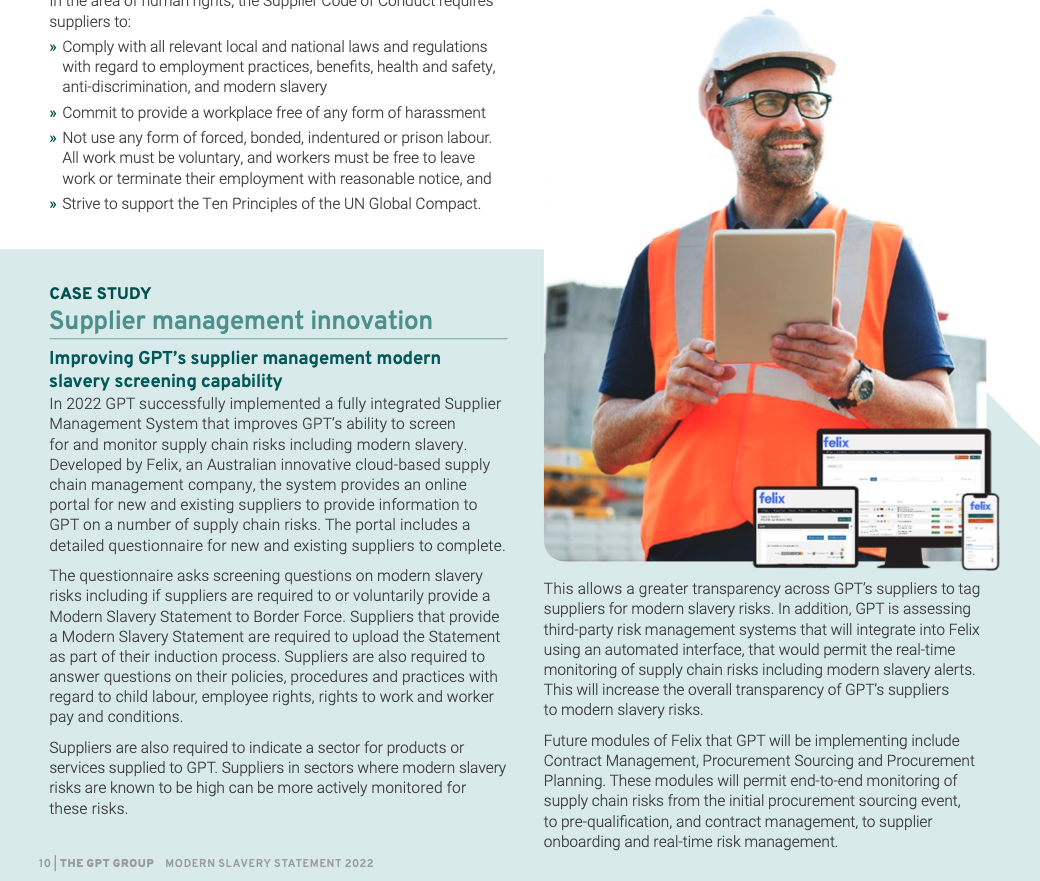
CPB’s Reconciliation Action Plan
CPB Contractors has spent a company record of $92 million with Aboriginal and Torres Strait Islander businesses in the 2021-22 financial year.
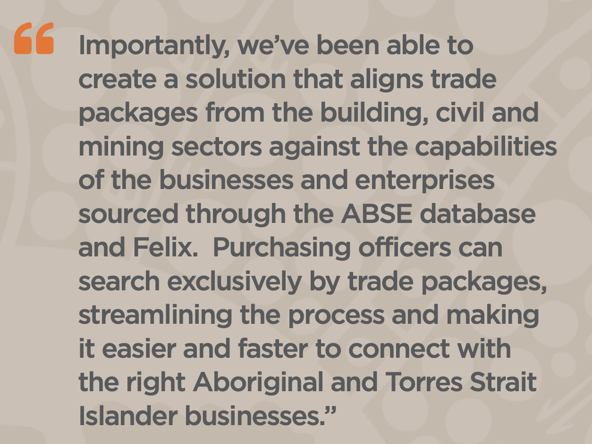
Source: CPB
We couldn’t be prouder to showcase how technology can enable responsible procurement and ESG.
Construction Culture
The Construction Industry Culture Taskforce (CICT) is a crucial initiative aimed at driving a positive and effective industry culture that caters to the broadest range of talent. Creating a more attractive industry for younger workers can establish a more resilient workforce to deliver the future infrastructure needs of Australia.
In October, the initiative moved into a pilot phase with 5 project sites across NSW and Victoria. It would be interesting to see the impact of flexible and capped working hours on construction workers, as well as increase in female participation.

Cybersecurity
Earlier this year, our Building in The Dark report found that 50% of participants were somewhat concerned or less about data breaches and cyberattacks.
That number could well be higher now, as this year’s high-profile cybersecurity breaches of Optus and Medibank have put things into perspective for businesses across Australia.
In construction, cyberattacks to an organisation’s supply network could form the next big wave as the risk extends to its consultants, contractors, subcontractors and suppliers.
Going analogue (or backwards) is not the solution here, of course. It’s more about having the correct processes, people and systems designed with security compliance in mind (e.g. ISO/IEC 27001:2013).
Industry events and webinars
With places opening up post-COVID, we were able to attend and host a few events this year. There has been an interesting convergence of themes and topics, which are accurately depicted in the following picture by ACA at the Future of Construction Summit (FCON).
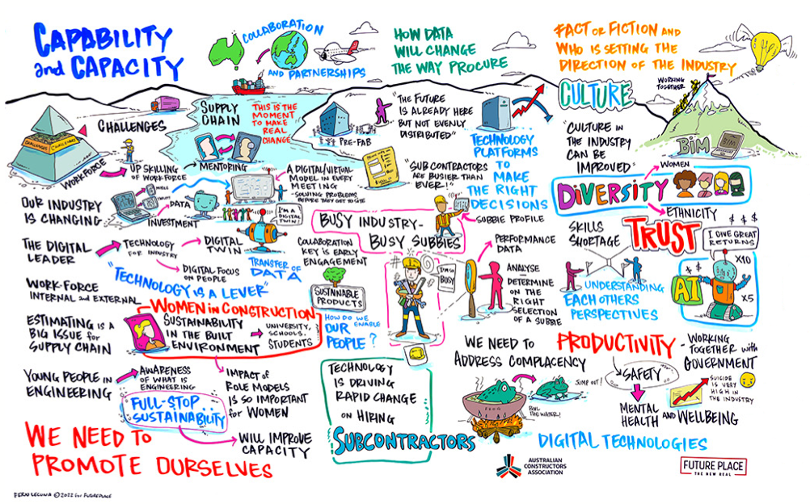
P.S. If you’re thinking of joining FCON23 in Melbourne, be sure to come say hi to us.
Not only capturing wisdom of thought leaders at events, we also invited some to be guest speakers on our webinar series this year, including:
- Lean Construction with Chairperson of Lean Construction ANZ
- Finance fireside chat with experts from Grant Thornton and McMahon Clarke
- ESG risk with experts from Sparke Helmore
10-year milestone
Time does fly when you’re having fun, and when you’re building a better way. We asked 10 Felix folks to share their thoughts as we celebrated a decade-long journey.
Product improvements
Along with 14 client implementations this year, the team has been busy improving the Felix platform, with over 200 product releases.
Some of Felix’s notable feature releases include:
- Sending questionnaires to vendors at anytime
- Changing RFQ ownership
- Smoother vendor onboarding
- Procurement Schedule access control enhancements
- Simplifying the RFQ response process for Vendors
- Pricing Schedule enhancements
- Contract key dates and reminders
- InEight Document integration
Platform growth
Always striving to be better, this year we’ve seen some encouraging stats:
- 44.1% increase in total vendors (across 70 countries)
- 64.1% increase in vendor invitations
- 123.8% increase in RFQs created
- 295.2% increase in projects created
- 65.7% increase in vendor evaluations performed
- 41.2% increase in vendor tags
Partnerships
This year, we've joined forces with InEight as a strategic partner with a native platform integration for InEight Document.
Felix has also partnered with Payapps as a preferred progress payment supplier.
Final words
Though challenges lie ahead, we believe the lessons learned this year and continuous awareness pieces by all industry players will help move the industry forward - one process at a time.
Thank you all – our clients, readers, shareholders, team members – who have been with us throughout the journey.
We wish you a very Merry Christmas and a prosperous year ahead.
----
The majority of the Felix team will be out of office from Thursday December 22nd and return Monday January 9th. Need Product Support over the break? Our team will be available Monday – Friday 7am – 7pm AEST excluding public holidays.
Product Support Holidays Hours:
- Thursday 22/12/2022: 7am – 7pm AEST
- Friday 23/12/2022: 7am – 7pm AEST
- Monday 26/12/2022: Closed
- Tuesday 27/12/2022: Closed
- Wednesday 28/12/2022: 7am – 7pm AEST
- Thursday 29/12/2022: 7am – 7pm AEST
- Friday 30/12/2022: 7am – 7pm AEST
- Monday 02/01/2023: Closed

Recent Articles
2025 in review: Milestones, insights and achievements
2025 – a year of that brought meaningful developments for Felix as we continue to address the evolving needs of organisations navigating complex supply-chain environments.
Top 10 reasons for a centralised vendor database
As organisations grow, so does the complexity of managing vendor relationships. Many still rely on spreadsheets or siloed systems, which can lead to inefficiencies, data inconsistencies, and compliance risks. A centralised vendor database offers a smarter, more scalable solution that brings structure, visibility, and control to procurement operations.
Here are the top 10 reasons why centralising your vendor data is a strategic move.
Five ways poor contract storage could be costing your organisation money
Contracts are the backbone of every business relationship – legally binding documents that define expectations, responsibilities, and value.
But what if the way your organisation stores those contracts is quietly costing you money?
Let's stay in touch
Get the monthly dose of supply chain, procurement and technology insights with the Felix newsletter.
.png)

